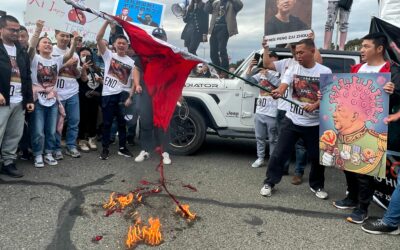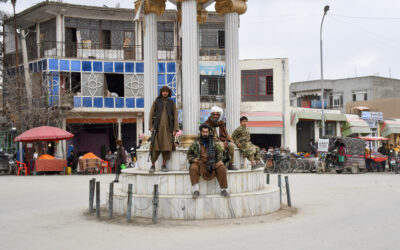
The Long Arm of China’s Security Services
SUBSCRIBER+ EXCLUSIVE REPORTING — When Chinese President Xi Jinping came to San Francisco last November to meet with President Joe Biden, Chinese pro-democracy activists in […] More
OPINION — Since 2014, Russia has waged three persistent and multifaceted wars of conquest against Ukraine. The unstated strategic goal of these successive wars is Russia’s premeditated and determined fragmentation of Ukrainian national territory.
The first Russian-Ukrainian war led to the territorial conquest of the Crimean Peninsula in 2014, and its annexation to the Russian Federation. The means used by Russia to appropriate this Ukrainian territory were then unconventional, that is, from the military point of view, without recourse to regular troops of the Russian army. Analysts and strategists have described this war as hybrid and multiform. This type of warfare combines special military operations, cyber elements and informational toxication, i.e. a disinformation campaign orchestrated by a state, in this case, Russia.
The Russian special forces (spetsnez in Russian) were deployed in Crimea in uniforms without badges, in order to hide their identity and that of the sponsoring state. For this reason, the journalists present in Crimea nicknamed them, “the little green men” due to the olive-green color of their fatigues. This nickname, most often associated with extraterrestrials in contemporary popular television culture (notably the X-files), also emphasized their presumed alien character.
The success of the ”conquest of Crimea” operation encouraged President Putin to launch in 2014-2015 a second hybrid war against Ukraine in the Donbass region of eastern Ukraine. The objective of this war was to amputate a new piece of Ukrainian territory in order to further dismember the country by political and military destabilization. Russian special forces, this time dressed as civilians, hid among the pro-Russian Ukrainian fighters in the region.
Today’s constant barrage of information makes it easy for countries to wage disinformation campaigns and your emotions are the weapon of choice. Learn how disinformation works and how we can fight it in this short video. This is one link you can feel good about sharing.
The hybrid war in Donbass was undoubtedly a military success for Putin. The institutions of the Ukrainian state were promptly expelled from the territory taken by the pro-Russian Ukrainian rebels. The next day, the Luhansk and Donetsk People’s Republics were proclaimed by the irredentist insurgents, supported, armed and recognized by Russia. The Donbass war lasted eight years, until February 24, 2022. The human losses from this conflict were estimated between 13,000 and 14,000 dead (soldiers and civilians combined).
The third war in Ukraine began on February 24, 2022, with a massive invasion of the Russian army from the territories of Russia and Belarus. On this occasion, Russia mobilized 190,000 soldiers to conquer and occupy the entire Ukrainian territory. To justify his entry into war against Ukraine, Putin offered, “the ongoing genocide against the Russian-speaking community of Donbass perpetrated by the Nazi government of Ukraine”. This is a baseless assertion, as no evidence was ever submitted by Russia to the UN International Court of Justice to validate this accusation. On the contrary, the Court ordered Russia to suspend its invasion of Ukraine on March 16, 2022; the order, however, remained a dead letter, deliberately ignored by President Putin.
The frontal and all-out war against Ukraine was also deliberately misleading, designated by Putin as a “special military operation”. Qualifying the ongoing war in such a way pursues the goal of hiding Russia’s real intentions from the Russian people and the international community.
After the hybrid war between 2014 and February 2022, Russia now favors the pursuit of a frontal conventional war. Why? Strategically speaking, such a change corresponds to new Russian goals for the war. This time Russia is no longer satisfied with just taking another piece of Ukrainian territory, but rather wants to occupy and dominate the whole country. The “blitzkrieg”, launched simultaneously on several fronts by the Russian army, aims at the annihilation of the Ukrainian armed forces and the rapid capture of major cities, including the capital, Kiev. Such a massive and all-out attack clearly underlines a desire by the Russians to eliminate both the Ukrainian government and President Volodymyr Zelensky.
After two months of fierce fighting however, it appears that the conquest of the whole Ukrainian territory is still out of reach for the Russian army. Unable to inflict decisive losses on the Ukrainian army, the Russian military is massively and indiscriminately bombing Ukrainian cities and causing an exodus of civilians, unseen in Europe since the Second World War. The war against Ukraine has forced 5 million Ukrainians to flee their country and another 6 million to become internal refugees.
By targeting civilians, the Russian army is violating the “jus in bello” (the law of war). In fact, the violence against civilians and cities in Ukraine has alerted UN institutions, in particular the General Assembly and the International Criminal Court (ICC). At the UN General Assembly session held on March 2, 2022, 141 member states condemned the Russian aggression against Ukraine; 35 abstained and only 5 supported Russia. Among the five states in favor were Russia and Belarus. Note here, that the UN currently has 193 member states.
The International Criminal Court (ICC) opened an investigation on March 2, 2022, into war crimes and crimes against humanity that may have been committed in Ukraine since 2013. This request was made to the Court by 39 of its 123 member states.
At a more strategic level, the element that is proving to be a determining factor in the present conflict is the surprising capacity of the Ukrainian military-civilian army to resist the ongoing Russian invasion. The Ukrainian army, by launching counter-offensives on several fronts, has forced the Russian occupiers to change their preferred form of warfare and strategic objectives. After six weeks of fighting, the Russian army has suffered devastating losses estimated between 10,000 and 12,000 soldiers. These are higher losses than those suffered by the Soviet army in Afghanistan during ten years of fighting (1979-1989).
After two months of combat, the Blitzkrieg initially practiced by the Russian army, has turned into siege warfare, which has entailed great suffering for the civilians in Ukraine’s larger cities. This form of warfare was also undertaken in the past by the Russian army in Chechnya (the siege of the capital, Grozny) and in Syria (the siege of Aleppo). Serbia, a Russian ally in the Balkans, also practiced this type of siege warfare against Bosnia and Croatia during the disintegration of Yugoslavia (1991-1995). The siege of Kharkiv bears similarities to that of Sarajevo in Bosnia and the siege of Mariupol to that of Vukovar in Croatia.
According to the latest reports, the Ukrainian defense of Mariupol seems on the verge of collapse despite defying a Russian ultimatum to surrender at the end of Easter weekend. This concerning development takes place after the humiliating, and highly symbolic, sinking of the Russian flagship of the Black Sea Fleet, thanks to what appears to have been a successful Ukrainian missile attack. In response, Russia’s military declared it’s clear intention to intensify strikes on the capital, Kyiv. The siege of Mariupol has been compared by Ukrainian and US officials to the siege of Leningrad during World War II.
Some of those responsible for the sieges of cities in Croatia and Bosnia were sentenced by the International Criminal Tribunal for the former Yugoslavia (ICTY). The case of the former president of Serbia, Slobodan Milosevic, who was accused by the ICTY of genocide and war crimes, is worth mentioning. He died in a cell before the end of his trial. On these grounds, it is to be hoped that the war criminals who are currently bombing Ukrainian cities and humanitarian corridors will end up before international justice.
The ongoing war in Ukraine is, strictly speaking, a war of stalemate and extermination. Once again, the Yugoslav example is revealing in the context of the present situation.
On one hand, the war in ex-Yugoslavia lasted from 1991 to 2000. On the other hand, the recent massacres in Bucha, near Kiev, during the withdrawal of Russian forces, are the most morbid proof of the will of Putin’s regime to enact extermination. They are blatantly reminiscent of the criminal ethnic cleansing of the war in Bosnia-Herzegovina (1992-1995).
France, Germany, Spain, Sweden, Italy and Denmark have announced the expulsion of dozens of Russian diplomats in response to alleged war crimes committed by the Russian army in Ukraine. Reciprocation should follow shortly on the Russian side. This type of war presages a long-lasting conflict.
To accelerate and find a lasting diplomatic solution in Ukraine, it is essential to help the Ukrainian army. At present, the United States, Great Britain and Canada are the most committed to arming Ukraine. It is also time for the members of the European Union to do more.
It is only the change in the balance of power on the battlefield that will force Russia to negotiate in good faith and bring peace to Ukraine.
After approximately two months of fighting, the repositioning and concentrating of the Russian armed forces in southeastern Ukraine, suggests that the Ukrainian state will eventually be divided into two distinct political units: eastern Ukraine, controlled entirely by Russia, and western Ukraine, controlled by the current government under President Zelensky.
This scenario is similar to the division of Korea at the end of the Korean War (1950-1953) into South and North Korea. The international community must mobilize more substantially to prevent this catastrophic scenario for the sovereignty, territorial integrity and security of Ukraine and, more broadly, that of Central and Eastern Europe.
The opinions expressed here are those of the authors alone and do not reflect the official policies or positions of Public Safety Canada or any of its components, or any other part of the Canadian government.
Sharing informed opinions is important. Opinion pieces represent the diverse views of The Cipher Brief audience and do not represent views of The Cipher Brief.
Related Articles

SUBSCRIBER+ EXCLUSIVE REPORTING — When Chinese President Xi Jinping came to San Francisco last November to meet with President Joe Biden, Chinese pro-democracy activists in […] More

SUBSCRIBER+EXCLUSIVE EXPERT PERSPECTIVE — More than two years after its withdrawal from Afghanistan, the U.S. still does not have a clear way forward in the […] More

SUBSCRIBER+ EXCLUSIVE REPORTING — Ukrainians greeted Saturday’s long-awaited House passage of $60.8 billion in aid with justifiable jubilation. For months, their soldiers, civilians, and political […] More

SUBSCRIBER+ EXCLUSIVE REPORTING — A race for control of space is underway, and just as on earth, the U.S. and China are the top competitors. […] More

SUBSCRIBER+ EXCLUSIVE REPORTING — For nearly a week, the Middle East and much of the world were on a knife’s edge, waiting for a promised […] More

BOTTOM LINE UP FRONT – Less than one week after Iran’s attack against Israel, Israel struck Iran early on Friday, hitting a military air base […] More
Search